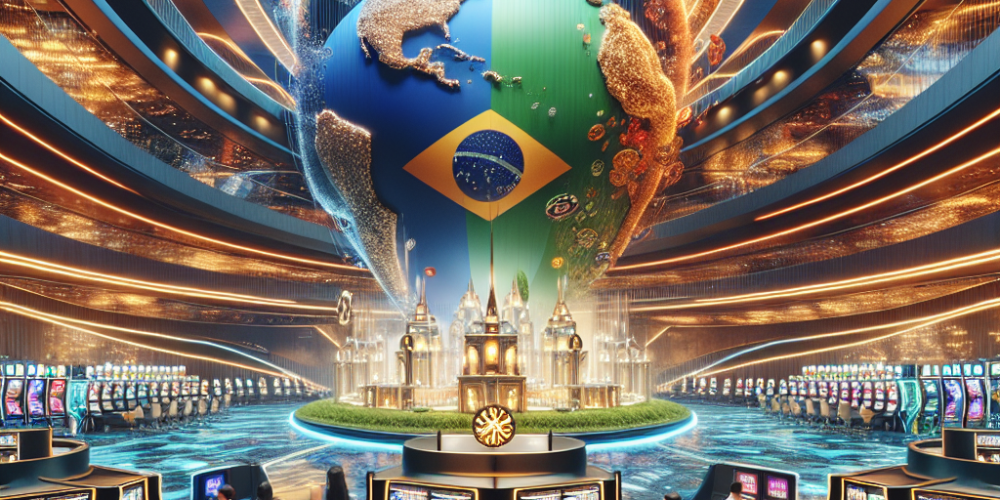In an audacious move that redefines the boundaries of technological advancement in the iGaming sector, Playtech unveiled its first fully-functional virtual reality (VR) casino in Brazil on March 10, 2025. This pioneering project, set in the heart of São Paulo, marks a significant milestone not only for Playtech but also for the global online gambling landscape. The launch of this VR casino is not merely an expansion of new technology but also a strategic foothold in one of the fastest-growing markets in the world.
Brazil’s recent legislative adjustments have opened up avenues for international investors and operators in the gambling sector. The Brazilian government, recognizing the potential economic benefits of legalized gambling, has been gradually easing regulations to welcome such innovative ventures. Playtech’s decision to introduce a VR casino in Brazil cleverly aligns with these regulatory changes, positioning the company to tap into a burgeoning market that has been largely untapped by VR technology.
The VR casino offers an immersive gaming experience that aligns virtual and physical gaming environments. Players wearing VR headsets can interact with a fully digitized casino floor, complete with slot machines, roulette tables, and poker rooms. This innovative platform is not just about enhancing user experience; it’s also about setting new standards in responsible gaming and security measures. The use of VR technology enables Playtech to implement features that monitor player behavior and gambling patterns more effectively, ensuring a safer gaming environment.
This strategic move by Playtech is indicative of their broader business strategy focused on technological leadership and geographical expansion. As one of the leading technology companies in the online gambling industry, Playtech has continuously pushed the boundaries of what’s possible in iGaming. Their investment in VR technology and its application in an emerging market like Brazil showcases their commitment to innovation.
“Bringing VR to Brazil is not just about harnessing the potential of new markets but also about transforming the user experience in gaming,” mentioned John Robertson, CEO of Playtech, at the launch event. “We believe that VR will revolutionize the way people gamble, making it more engaging and immersive. This is just the beginning of our journey towards transforming the global iGaming landscape.”
From an economic perspective, the introduction of such technology could significantly boost local economies. It creates new job opportunities in technology and customer service sectors and generates tax revenues from gambling profits. The fusion of technology and local talent can also foster an ecosystem conducive to further technological innovations.
However, the implementation of VR casinos also poses challenges, particularly in areas like security, regulatory compliance, and ethical gambling. Ensuring that the VR environment adheres to the strict gambling regulations set by Brazilian authorities is crucial. Moreover, there is a concern about the potential for increased gambling addiction with more immersive and engaging platforms like VR. Playtech needs to navigate these issues carefully to ensure that their VR platform is not only profitable but also responsible.
Critics of VR gambling argue that the technology might lead to higher instances of gambling addiction, given the immersive nature of the platform. They suggest that constant monitoring and the implementation of robust preventive measures are essential to mitigate such risks. On the other hand, proponents argue that VR can provide a controlled environment where player behavior is more easily monitored and interventions can be made more effectively than in physical or traditional online casinos.
Looking ahead, the success of Playtech’s VR casino in Brazil could set a precedent for other markets worldwide. If the São Paulo project proves to be a success, it could lead to more widespread adoption of VR technology in the gambling industry, potentially leading to a global transformation of how casino games are played.
In conclusion, Playtech’s launch of a VR casino in Brazil is a landmark event that highlights the synergy between technological innovation and market opportunity. It not only exemplifies the potential growth trajectories for the iGaming industry but also challenges other players in the market to rethink how technology can be used to enhance the gambling experience while promoting responsible gaming practices. As the industry continues to evolve, it will be interesting to see how other companies and regulators respond to the changes brought about by such advanced technologies.

Garry Sputnim is a seasoned journalist and storyteller with over a decade of experience in the trenches of global news. With a keen eye for uncovering stories that resonate, Alex has reported from over 30 countries, bringing light to untold narratives and the human faces behind the headlines. Specializing in investigative journalism, Garry has a knack for technology and social justice issues, weaving compelling narratives that bridge tech and humanity. Outside the newsroom, Garry is an avid rock climber and podcast host, exploring stories of resilience and innovation.
















